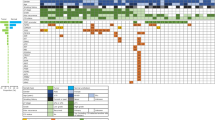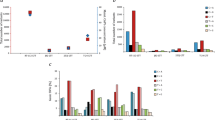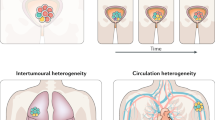Abstract
Analysis of human tumour-derived cell lines has previously resulted in the identification of novel transformation-related elements and provided a useful tool for functional studies of different genes. To establish the utility of such cell lines as indicators of change relevant to urothelial cancer, we have characterised the expression of five genes (p53, MDM2, Rb, E-cadherin, APC) within a panel of human bladder carcinoma cell lines. Using single-strand conformation polymorphism (SSCP) and direct sequencing, p53 mutations were identified in 7/15 (47%) cell lines reflecting events reported in bladder tumours. Immunohistochemical analysis of p53 in cultured cells and in paraffin-embedded sections of xenografts from the cell line panel revealed discordant results. An absence of p53 nuclear staining was associated with an exon 5 mutation in EJ and with multiple p53 mutations found in J82. Two cell lines positive for p53 staining in the absence of detectable mutation displayed overexpression of MDM2 (PSI, HT1197) in Western blot analysis. Loss or aberrant Rb expression was recorded in 5/15 (TCCSUP, SCaBER, 5637, HT1376, J82) cell lines. Absence of E-cadherin was recorded in 5/15 cell lines (TCCSUP, EJ, KK47, UM-UC-3, J82) with loss of alpha-catenin in immunoprecipitated E-cadherin complexes of CUBIII. Western blot analysis of APC revealed a truncated protein in 1/15 (CUBIII) cell lines. The characterisation of oncogenic events within this panel of human bladder carcinoma cell lines establishes a representation of change observed in bladder tumours and better defines the genotypic background in these experimental human cell models of neoplastic progression.
This is a preview of subscription content, access via your institution
Access options
Subscribe to this journal
Receive 24 print issues and online access
$259.00 per year
only $10.79 per issue
Buy this article
- Purchase on Springer Link
- Instant access to full article PDF
Prices may be subject to local taxes which are calculated during checkout
Similar content being viewed by others

Author information
Authors and Affiliations
Rights and permissions
About this article
Cite this article
Rieger, K., Little, A., Swart, J. et al. Human bladder carcinoma cell lines as indicators of oncogenic change relevant to urothelial neoplastic progression. Br J Cancer 72, 683–690 (1995). https://doi.org/10.1038/bjc.1995.394
Issue Date:
DOI: https://doi.org/10.1038/bjc.1995.394
This article is cited by
-
Downregulation of topoisomerase 1 and 2 with acriflavine sensitizes bladder cancer cells to cisplatin-based chemotherapy
Molecular Biology Reports (2022)
-
PEPD is a pivotal regulator of p53 tumor suppressor
Nature Communications (2017)
-
Epithelial–mesenchymal transition promotes SOX2 and NANOG expression in bladder cancer
Laboratory Investigation (2017)
-
Functional analyses and prognostic significance of SFRP1 expression in bladder cancer
Journal of Cancer Research and Clinical Oncology (2015)
-
The UBC-40 Urothelial Bladder Cancer cell line index: a genomic resource for functional studies
BMC Genomics (2015)


